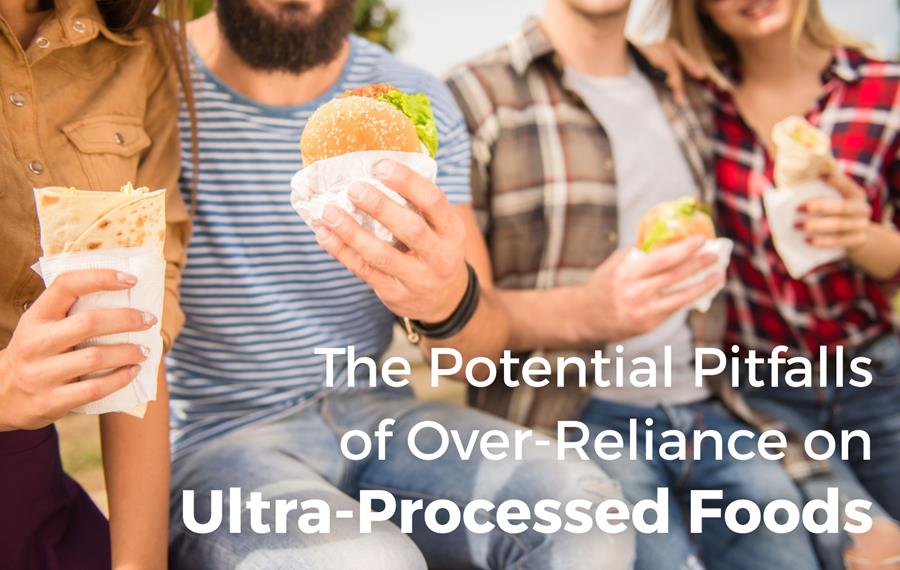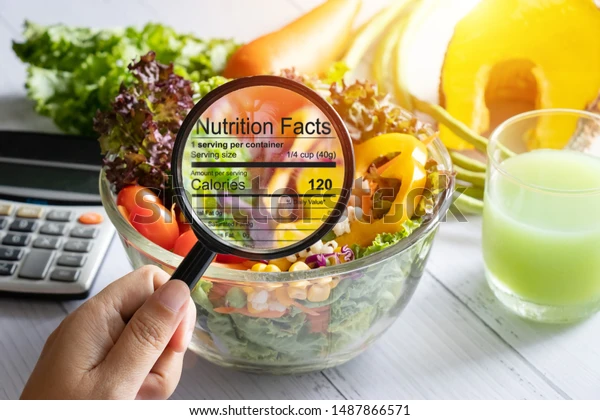Your supermarket shop could be impacting your health. This may sound like an overly dramatic statement. However, there is a great deal of evidence to suggest that what British people put in their supermarket trolleys each week has a direct correlation with the rising incidence of many common health problems. We are not just talking about purchases high in salt, fat or sugar either. This is a more insidious issue, and even people who believe they buy and prepare ‘healthy’ foods could be unwittingly experiencing shortfalls in fundamental and vital nutrients.

That is largely, because more than half of what people put into their supermarket trolleys is classified as ultra-processed food. Products that many modern consumers rely on, unaware of the ‘tinkering’ that has reduced the value of the natural ingredients they see on the packaging.
You could even be buying products that sound healthy when you read the labels, but in fact, contain less bioavailable and lower-quality nutritional compounds.
Or worse still, despite pressure on manufacturers to cut down on potentially toxic additives, you could still be consuming ingredients that are harmful to you.
Of course, manufacturers of processed and ultra-processed foods have a vested interest in ensuring that you choose them more often, rather than creating dishes from scratch using fresh ingredients.
So, what is really going on in your weekly shopping?
Identifying ultra-processed foods
Our parents were very accustomed to shopping locally and regularly, to get fresh ingredients to use in regular family favourites. Now, shoppers can buy foods from around the world in their local supermarket, ready prepared for convenience and speed.
Being able to shop in one place - and stock up on a week’s worth of diverse and convenient products - involves being offered more processed and ultra-processed foods. These are products designed to travel over large distances, have elongated shelf lives in supermarkets, and sit in our own kitchen storage areas for longer.
Processed foods are clearly ones no longer in a natural form, as they have been chopped, added to, heated and tinned for example. So, what is ultra-processed food?
The Soil Association defines these as engineered foodstuffs that “typically contain little or no whole foods, are ready-to-consume or heat and are made using industrial additives and processes.”
In its ‘Ultra Processed Planet’ report, the association said: “We know that ultra-processed foods can be detrimental to our health. A robust body of science has found that diets rich in such products are associated with increased rates of obesity, metabolic disorders, depression, and all-cause mortality. As ultra-processed foods have become more prevalent globally, a wave of chronic disease has washed across the planet, and this health crisis has accelerated in parallel with the climate emergency and the destruction of the natural world.”
A vivid illustration – a common purchase that’s carcinogenic
If that doesn’t alarm you, perhaps it would help to look at a regularly purchased foodstuff that is of dubious nutritional value and is known to be carcinogenic.
Do you buy pre-cooked meats like sliced ham, commonly used sandwiches, salads and quick family meals?
First, even premium sliced ham that looks recently carved from a gammon is likely to be formed or reformed meat created in a mould. It is also likely to be one-third water, and have additives to enhance flavour, colour and shelf-life. This could include sugar – yes sugar – and salt of course, as well as sodium nitrite and potassium nitrate, to act as preservatives.
Don’t mistake these as the sodium and potassium that are easily absorbed and used, and beneficial to our body. Nitrate is an inorganic salt, often used for industrial purposes including manufacturing fertiliser. That is not the same as a bioavailable and beneficial organic citrate – as we discussed in our article on 'The truth about minerals; and food supplements worth buying'.
Not only does it not contain good quality nutrients, but processed meat may prove harmful.
The World Health Organisation said: “Most processed meats contain pork or beef, but processed meats may also contain other red meats, poultry, offal, or meat by-products such as blood.”
WHO classified processed meats as Group 1 (like cigarettes and asbestos) as they are carcinogenic to humans. It concluded there is “sufficient evidence from epidemiological studies that eating processed meat causes colorectal cancer.”
Contrast that with a piece of meat bought at a local butcher or farmer’s market, that you cook yourself to replace processed products. It will retain all the nutrients that meat provides, without the ‘nasties’ added during mass production of supermarket choices!
The gaps in nutrition due to ultra-processed food buying
Processed meats are far from alone in their disappointing – if not harmful – nutritional value.
Processed and ultra-processed foods can legitimately contain artificial ingredients that are often an eye-opener, including dyes, stabilisers, flavour enhancers, sweeteners and unhealthy oils to add volume or cook ingredients cheaply.
Many other commonly purchased foodstuffs have been heated, handled or modified in ways that reduce their quota of usable omega-3, vitamins, minerals and trace elements.
Don’t simply assume this covers the obvious items such as hot dog sausages, frozen chicken nuggets, fizzy drinks and ready meals. For example, cakes, biscuits, energy bars, instant sauces, milk drinks, breakfast cereals and even yoghurts and baby products can easily fall into the category of ultra-processed foods.
Even apparently ‘healthy’ slimming meals are often ultra-processed to remove calories (and many of the valuable nutrients as a result).
Some nutritional compounds are more delicate than others, and production processes easily strip them out. For example, you may be consuming less magnesium, selenium and omega 3 than you realise, despite the fact you see foods rich in those nutrients mentioned in the ingredients.
Take for instance an egg one of the most nutritionally beneficial things you can eat. When you cook it on high heat in your own kitchen, you can easily destroy 20 per cent of its vitamin A, and 18 per cent of its antioxidant value.
Now imagine the heat used in industrial food production to create pre-prepared dishes and other products that contain eggs. How many vitamins and antioxidants survive?
Are ultra-processed foods a national addiction?
With all the current emphasis on the link between good nutrition and health protection, why do people still use these products so readily?
The convenience, long shelf life and in some cases, cost savings that can come from buying pre-prepared ingredients and complete meals are all beguiling factors.
Also, manufacturers tinker with recipes to increase their appeal and make them ‘moreish’, so you purchase them again. One of the most common ways to do this is to sweeten even savoury foodstuffs and to mute stronger flavours that could be off-putting. Though, of course, this is a vicious circle, as children raised on processed foods can find strong flavours ‘off putting’ and parents reach for supermarket solutions as it is ‘all they will eat”.
Manufacturers invest heavily in attractive packaging and advertising too, to ensure consumers ‘forget’ to focus on nutritional value.
Also, the economy supports the development of manufacturing supply chains. For instance, the market value of milk is low, compared to the premium prices you can charge for ‘luxury ice cream’.
The Soil Association report on this topic states: “Ultra-processed products are manufactured to pique our preference for fatty or energy-dense foods, weakening appetite control and creating novel eating patterns which translate into more frequent purchases.”
This then spurs greater investment in the production of ultra-processed foods and “voluminous production has often been attained at the expense of human and ecological wellbeing.”
In other words, not only are we compromising our health and well-being by our reliance on these foods, we are also damaging our planet too!
The solution
Finally, it is only fair to point out that avoiding all processed food can be extremely difficult, especially as a working parent. Good quality shop-bought bread, for example, can be a daily essential, and beer and wine are rarely something that is homemade.
However, it’s highly recommended that you seek out minimally processed items – such as yoghurts with no added sugar, and pre-prepared foods with no additives at all.
The rule of thumb when shopping should be that the longer the list of ingredients and the further it is from its original form, the more you should avoid it.
Switch instead to unprocessed foodstuffs such as fresh fruit and vegetables, dairy products, eggs, fish and meat (preferably locally sourced). As well as using nuts, seeds, grains, beans and pulses. With a little more time and creativity, you can prepare meals and snacks that protect your health.
Also, buying from local farmers and producers – especially those operating on organic principles – gives you the assurance your shopping has not lost nutritional value from the way it is grown, transported and prepared for display.
For some people, this is a more urgent need. Our guts react differently to processed and ultra-processed foods, (Do men and women have a different gut reaction to highly processed foods).
Limiting your access to valuable nutrients by choosing supermarket staples could be running alongside a growing inability to absorb essential fatty acids, vitamins and minerals as you age.
If this is the case for you, then good quality food supplements, alongside purposeful nutrients in your diet, could be your ultra-solution.
https://www.theguardian.com/uk/2005/nov/03/foodanddrink
https://www.bbc.com/future/article/20190311-what-are-nitrates-in-food-side-effects




